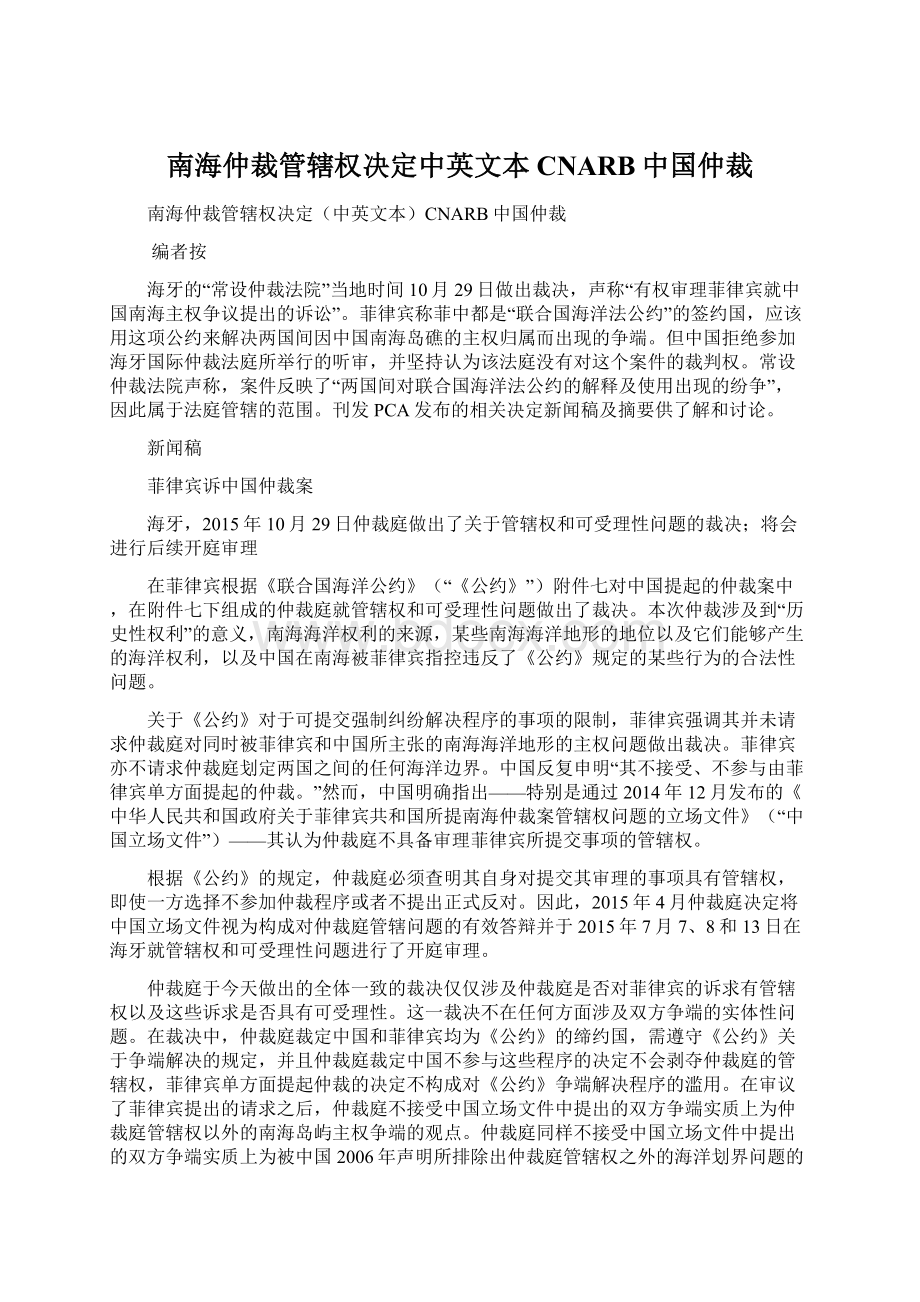南海仲裁管辖权决定中英文本CNARB中国仲裁.docx
《南海仲裁管辖权决定中英文本CNARB中国仲裁.docx》由会员分享,可在线阅读,更多相关《南海仲裁管辖权决定中英文本CNARB中国仲裁.docx(9页珍藏版)》请在冰豆网上搜索。

南海仲裁管辖权决定中英文本CNARB中国仲裁
南海仲裁管辖权决定(中英文本)CNARB中国仲裁
编者按
海牙的“常设仲裁法院”当地时间10月29日做出裁决,声称“有权审理菲律宾就中国南海主权争议提出的诉讼”。
菲律宾称菲中都是“联合国海洋法公约”的签约国,应该用这项公约来解决两国间因中国南海岛礁的主权归属而出现的争端。
但中国拒绝参加海牙国际仲裁法庭所举行的听审,并坚持认为该法庭没有对这个案件的裁判权。
常设仲裁法院声称,案件反映了“两国间对联合国海洋法公约的解释及使用出现的纷争”,因此属于法庭管辖的范围。
刊发PCA发布的相关决定新闻稿及摘要供了解和讨论。
新闻稿
菲律宾诉中国仲裁案
海牙,2015年10月29日仲裁庭做出了关于管辖权和可受理性问题的裁决;将会进行后续开庭审理
在菲律宾根据《联合国海洋公约》(“《公约》”)附件七对中国提起的仲裁案中,在附件七下组成的仲裁庭就管辖权和可受理性问题做出了裁决。
本次仲裁涉及到“历史性权利”的意义,南海海洋权利的来源,某些南海海洋地形的地位以及它们能够产生的海洋权利,以及中国在南海被菲律宾指控违反了《公约》规定的某些行为的合法性问题。
关于《公约》对于可提交强制纠纷解决程序的事项的限制,菲律宾强调其并未请求仲裁庭对同时被菲律宾和中国所主张的南海海洋地形的主权问题做出裁决。
菲律宾亦不请求仲裁庭划定两国之间的任何海洋边界。
中国反复申明“其不接受、不参与由菲律宾单方面提起的仲裁。
”然而,中国明确指出——特别是通过2014年12月发布的《中华人民共和国政府关于菲律宾共和国所提南海仲裁案管辖权问题的立场文件》(“中国立场文件”)——其认为仲裁庭不具备审理菲律宾所提交事项的管辖权。
根据《公约》的规定,仲裁庭必须查明其自身对提交其审理的事项具有管辖权,即使一方选择不参加仲裁程序或者不提出正式反对。
因此,2015年4月仲裁庭决定将中国立场文件视为构成对仲裁庭管辖问题的有效答辩并于2015年7月7、8和13日在海牙就管辖权和可受理性问题进行了开庭审理。
仲裁庭于今天做出的全体一致的裁决仅仅涉及仲裁庭是否对菲律宾的诉求有管辖权以及这些诉求是否具有可受理性。
这一裁决不在任何方面涉及双方争端的实体性问题。
在裁决中,仲裁庭裁定中国和菲律宾均为《公约》的缔约国,需遵守《公约》关于争端解决的规定,并且仲裁庭裁定中国不参与这些程序的决定不会剥夺仲裁庭的管辖权,菲律宾单方面提起仲裁的决定不构成对《公约》争端解决程序的滥用。
在审议了菲律宾提出的请求之后,仲裁庭不接受中国立场文件中提出的双方争端实质上为仲裁庭管辖权以外的南海岛屿主权争端的观点。
仲裁庭同样不接受中国立场文件中提出的双方争端实质上为被中国2006年声明所排除出仲裁庭管辖权之外的海洋划界问题的观点。
相反,仲裁庭裁定菲律宾的每一项诉求反映了两国之间关于《公约》解释和适用的争端。
仲裁庭裁定没有其他国家为此仲裁程序的必要第三方。
关于《公约》规定的仲裁庭行使管辖权的先决条件,仲裁庭不接受中国立场文件中提出的关于2002年中国-东盟《南海各方行为宣言》构成将涉及南海的争端限定仅通过协商解决的协议的观点。
相反,仲裁庭裁定中国-东盟宣言为一项不存在使之具有法律约束力的意向的政治性文件,因此与《公约》中关于给予双方同意的纠纷解决方式优先效力的规定不具有相关性。
仲裁庭同样裁定中国与菲律宾的某些其他协议和联合声明不排除菲律宾寻求通过《公约》解决与中国争端的做法。
仲裁庭进一步裁定菲律宾满足了《公约》关于双方就纠纷解决交换意见的要求,并且菲律宾已经尝试在《公约》和一般国际法要求的范围内寻求与中国协商。
仲裁庭接下来审议了《公约》中对涉及特定事项的争端免于被提交强制程序的限制和例外性规定。
仲裁庭注意到在某些情况下,这些限制和例外是否适用于菲律宾的诉求与诉求的实体性问题相关。
例如,仲裁庭是否有管辖权审理中国在南海历史性权利的主张可能取决于仲裁庭对于中国权利主张的性质的评估。
同样,仲裁庭是否有管辖权审理中国在南海的活动可能取决于仲裁庭对于中国所主张的任一海洋地形是否为可以产生与菲律宾主张相重合的海洋区域的岛屿的问题的裁决。
仲裁庭亦留意到某些活动的地点以及《公约》对军事活动的例外性规定可能影响其对菲律宾部分诉求的管辖权。
鉴于以上段落,仲裁庭得出如下结论,即其目前可以裁决其对菲律宾的七项诉求下的事项具有管辖权。
然而,仲裁庭同时得出结论,其对菲律宾其他七项诉求的管辖权需要与实体性问题一并审议。
仲裁庭同时要求菲律宾就其一项主张进行澄清并限缩其范围。
仲裁庭将对菲律宾诉求的实体性问题进行进一步开庭审理。
在听取双方意见后,仲裁庭已经暂时性地确定了对实体性问题开庭审理的时间。
与管辖权和可受理性问题的庭审相同,实体性问题的庭审将不对公众开放,然而仲裁庭将考虑利益相关国家派遣小型代表团作为观察员的请求。
常设仲裁法院作为本案书记处将在实体性问题开庭审理开始和结束时发布进一步新闻稿。
仲裁庭预计其将在2016年做出关于实体性问题和剩余管辖权问题的裁决。
下文为较为详细的对仲裁庭论证的摘要。
PRESSRELEASEARBITRATIONBETWEENTHEREPUBLICOFTHEPHILIPPINESANDTHEPEOPLE’SREPUBLICOFCHINATheHague,29October2015TheTribunalRendersAwardonJurisdictionandAdmissibility;WillHoldFurtherHearingsTheTribunalconstitutedunderAnnexVIItotheUnitedNationsConventionontheLawoftheSea(the“Convention”)inthearbitrationinstitutedbytheRepublicofthePhilippinesagainstthePeople’sRepublicofChinahasissueditsAwardonJurisdictionandAdmissibility.Thisarbitrationconcernstheroleof“historicrights”andthesourceofmaritimeentitlementsintheSouthChinaSea,thestatusofcertainmaritimefeaturesintheSouthChinaSeaandthemaritimeentitlementstheyarecapableofgenerating,andthelawfulnessofcertainactionsbyChinaintheSouthChinaSeathatareallegedbythePhilippinestoviolatetheConvention.InlightoflimitationsonthemattersthatcanbesubmittedtocompulsorydisputesettlementundertheConvention,thePhilippineshasemphasizedthatitisnotrequestingtheTribunaltodecidethequestionofsovereigntyovermaritimefeaturesintheSouthChinaSeathatareclaimedbyboththePhilippinesandChina.NorhasthePhilippinesrequestedtheTribunaltodelimitanymaritimeboundarybetweenthetwoStates.Chinahasrepeatedlystatedthat“itwillneitheracceptnorparticipateinthearbitrationunilaterallyinitiatedbythePhilippines.”Chinahas,however,madeclearitsview—inparticularthroughthepublicationinDecember2014ofa“PositionPaperoftheGovernmentofthePeople’sRepublicofChinaontheMatterofJurisdictionintheSouthChinaSeaArbitrationInitiatedbytheRepublicofthePhilippines”(“China’sPositionPaper”)—thattheTribunallacksjurisdictiontoconsiderthePhilippines’Submissions.UndertheConvention,anarbitraltribunalmustsatisfyitselfthatithasjurisdictiontodecideamatterpresentedtoit,evenifapartychoosesnottoparticipateintheproceedingsortomakeaformalobjection.Accordingly,theTribunaldecidedinApril2015thatitwouldtreatChina’sPositionPaperaseffectivelyconstitutingapleaconcerningtheTribunal’sjurisdictionandconvenedaHearingonJurisdictionandAdmissibilitythattookplaceinTheHagueon7,8and13July2015.TheTribunal’sAwardoftoday’sdateisunanimousandconcernsonlywhethertheTribunalhasjurisdictiontoconsiderthePhilippines’claimsandwhethersuchclaimsareadmissible.TheAwarddoesnotdecideanyaspectofthemeritsoftheParties’dispute.InitsAward,theTribunalhasheldthatboththePhilippinesandChinaarepartiestotheConventionandboundbyitsprovisionsonthesettlementofdisputes.TheTribunalhasalsoheldthatChina’sdecisionnottoparticipateintheseproceedingsdoesnotdeprivetheTribunalofjurisdictionandthatthePhilippines’decisiontocommencearbitrationunilaterallywasnotanabuseoftheConvention’sdisputesettlementprocedures.ReviewingtheclaimssubmittedbythePhilippines,theTribunalhasrejectedtheargumentsetoutinChina’sPositionPaperthattheParties’disputeisactuallyaboutsovereigntyovertheislandsintheSouthChinaSeaandthereforebeyondtheTribunal’sjurisdiction.TheTribunalhasalsorejectedtheargumentsetoutinChina’sPositionPaperthattheParties’disputeisactuallyaboutthedelimitationofamaritimeboundarybetweenthemandthereforeexcludedfromtheTribunal’sjurisdictionthroughadeclarationmadebyChinain2006.Onthecontrary,theTribunalhasheldthateachofthePhilippines’SubmissionsreflectdisputesbetweenthetwoStatesconcerningtheinterpretationorapplicationoftheConvention.TheTribunalhasalsoheldthatnootherStatesareindispensabletotheproceedings.TurningtothepreconditionstotheexerciseoftheTribunal’sjurisdictionsetoutintheConvention,theTribunalhasrejectedtheargumentinChina’sPositionPaperthatthe2002China–ASEANDeclarationontheConductofPartiesintheSouthChinaSeaconstitutesanagreementtoresolvedisputesrelatingtotheSouthChinaSeaexclusivelythroughnegotiation.Onthecontrary,theTribunalhasheldthattheChina–ASEANDeclarationwasapoliticalagreementthatwasnotintendedtobelegallybindingandwasthereforenotrelevanttotheprovisionsintheConventionthatgiveprioritytotheresolutionofdisputesthroughanymeansagreedbetweentheParties.TheTribunalhaslikewiseheldthatcertainotheragreementsandjointstatementsbyChinaandthePhilippinesdonotprecludethePhilippinesfromseekingtoresolveitsdisputewithChinathroughtheConvention.Further,theTribunalhasheldthatthePhilippineshasmettheConvention’srequirementthatthePartiesexchangeviewsregardingthesettlementoftheirdisputeandhassoughttonegotiatewithChinatotheextentrequiredbytheConventionandgeneralinternationallaw.TheTribunalthenconsideredthelimitationsandexceptionssetoutintheConventionthatprecludedisputesrelatingtocertainsubjectsfrombeingsubmittedtocompulsorysettlement.TheTribunalobservedthatwhethertheselimitationsandexceptionswouldapplytothePhilippines’claimswas,insomecases,linkedtothemeritsoftheclaims.Forinstance,whethertheTribunalwouldhavejurisdictiontoaddressChina’sclaimstohistoricrightsintheSouthChinaSeamaydependupontheTribunal’sassessmentofthenatureofChina’sclaimedrights.Similarly,whethertheTribunalwouldhavejurisdictiontoaddressChineseactivitiesintheSouthChinaSeamaydependupontheTribunal’sdecisiononwhetheranyofthemaritimefeaturesclaimedbyChinaareislandscapableofgeneratingmaritimezonesoverlappingthoseofthePhilippines.TheTribunalalsonotedthatthelocationofcertainactivitiesandtheConvention’sexceptionformilitaryactivitiesmayaffectitsjurisdictionovercertainofthePhilippines’claimsInlightoftheforegoing,theTribunalhasconcludedthatitispresentlyabletodecidethatitdoeshavejurisdictionwithrespecttothemattersraisedinsevenofthePhilippines’Submissions.TheTribunalhasconcluded,however,thatitsjurisdictionwithrespecttosevenotherSubmissionsbythePhilippineswillneedtobeconsideredinconjunctionwiththemerits.TheTribunalhasrequestedthePhilippinestoclarifyandnarrowoneofitsSubmissions.TheTribunalwillconveneafurtherhearingonthemeritsofthePhilippines’claims.InconsultationwiththeParties,theTribunalhasprovisionallysetthedatesforthemeritshearing.AswiththeHearingonJurisdictionandAdmissibility,thehearingonthemeritswillnotbeopentothepublic,howevertheTribunalwillconsiderrequestsfrominterestedStatestosendsmalldelegationsofobservers.ThePermanentCourtofArbitration(the“PCA”),whichactsasRegistryinthecase,willissuefurtherPressReleasesuponthecommencementandclosingofthemeritshearing.TheTribunalexpectsthatitwillrenderitsAwardonthemeritsandremainingjurisdictionalissuesin2016.AnexpandedsummaryoftheTribunal’sreasoningissetoutbelow.***
管辖权和可受理性问题的裁决的摘要
1.仲裁案以及管辖权和可受理性程序的背景
本次仲裁涉及菲律宾对三项互相联系的涉及菲律宾和中国在南海关系的事项进行裁决的请求。
第一,菲律宾请求仲裁庭做出对双方在南海权利和义务的渊源以及《公约》对于中国在所谓“九段线”内“历史性权利”的主张的效力的裁决。
第二,菲律宾请求仲裁庭做出某些被菲律宾和中国同时主张的海洋地形被恰当地定义为《公约》下的岛屿,礁石,低潮高地或者水下地物。
这些海洋地形在《公约》下的地位可能决定它们所能产生的海洋区域。
最后,菲律宾请求仲裁庭裁定中国在南海的某些活动是否违反《公约》规定,包括干扰菲律宾行使《公约》下的主权权利和自由或者进行危害海洋环境的建设和渔业活动。
2
中国政府在此前进行的一系列程序中采取不接受、不参与仲裁的立场。
该立场在其照会、公开声明以及于2014年12月7日发布的《中华人民共和国政府关于菲律宾共和国所提南海仲裁案管辖权问题的立场文件》,以及两封由中国驻荷兰王国大使至仲裁庭成员的信函中被重申。
中国政府同时表示,以上声明及文件“决不得被解释为中国以任何形式参与仲裁程序。
”
在《公约》中,根据附件七组成的仲裁庭的管辖权限于缔约国之间关于《公约》解释和适用所产生的争端。
但《公约》排除了法庭关于特定种类争端的管辖权,并且规定了任何仲裁庭在行使管辖权之前必须满足的先决条件。
根据第四号程序令中罗列并在常设仲裁法院第四新闻稿(2015年4月22日,请见中解释的原因,仲裁庭将中国的通信视为关于菲律宾诉求超出仲裁庭管辖权的有效抗辩。
于是,仲裁庭在2015年7月就菲律宾诉求的管辖权和可受理性问题进行了初步开庭审理。
仲裁